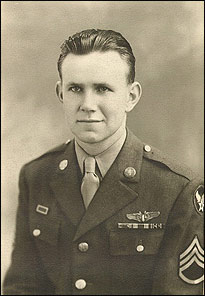Bombardment prior to the drop
Phil Garey; 331st Squadron, 94th Bomb Group, 4th Wing, Eight Air force.
It is September 17, London time is 2:00. Everything is still very quiet at the Airbase near the Tiny village called Rougham, in Suffolk, England. This was about to change. The Sergeant on duty comes into our tent and we are woke in a gentile manner by his loud voice. The whole crew knows the drill by now. Breakfast is served in thirty minutes in the Combat Crews Mess and you have to be sure you don't miss it because you would have anything more before you get back. At this point we don't know what the target will be, so it could be Berlin and that will mean hours and hours of flying at high altitude. Were on oxygen most of the time and that combined with the adrenaline which would be pumping, the whole this was always a very exhausting experience. On this morning we had been through the whole thing twenty-five times and we could consider ourselves very lucky, never to have received any casualties.

When the officers have received their briefing we are told that the target for this day will be the Flak batteries near Nijmegen. The purpose of this mission is to suppress the batteries right before the paratroopers of the 82nd Airborne come in. These paratroopers are part of the large airborne landing that has the goal of establishing a bridgehead into Holland across all the major bridges up to the Rhine bridge at Arnhem. We knew that the lives of these paratroopers partly depended on us. If we failed, many casualties would be made among the paratroopers, before they hit the ground. We came in on the target at eight or nine thousand feet. The navigator/bomb-aimer couldn't get a clear view the first time we flew over Nijmegen. The opposing Flak was fairly light at that time, so the pilot flew three rounds before the navigator could find a perfect target. Not long after the signal "bombs away" had sounded and the B17 had been lifted into the air because of the loss of weight, the dropping of Parachutists and Gliders started. We had turned and were on our way back, when I saw the air being filled with small dots. I was tail gunner, which gave me a perfect view. Flying over the target for the third time ment that we were the last bomber to leave the area and I was probably the one with the best ticket to see the drop. It was impressive, to say the least.
Read more on Phil Garey's war experiences on this website
Books about the 82nd Airborne Division in WWII
© All rights reserved
Contact





